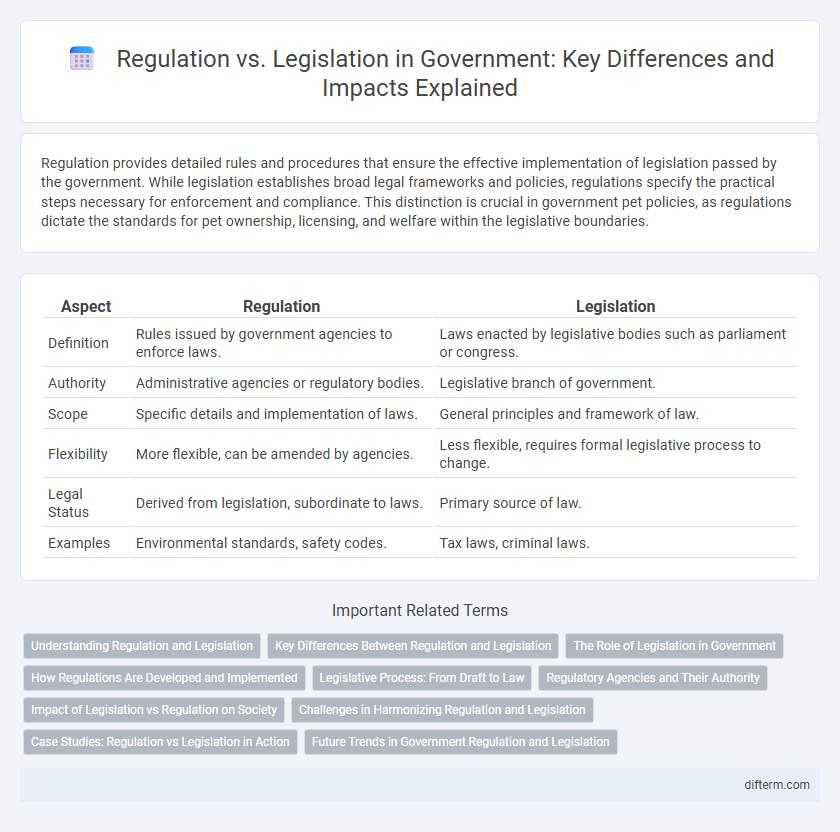Regulation provides detailed rules and procedures that ensure the effective implementation of legislation passed by the government. While legislation establishes broad legal frameworks and policies, regulations specify the practical steps necessary for enforcement and compliance. This distinction is crucial in government pet policies, as regulations dictate the standards for pet ownership, licensing, and welfare within the legislative boundaries.
Table of Comparison
| Aspect | Regulation | Legislation |
|---|---|---|
| Definition | Rules issued by government agencies to enforce laws. | Laws enacted by legislative bodies such as parliament or congress. |
| Authority | Administrative agencies or regulatory bodies. | Legislative branch of government. |
| Scope | Specific details and implementation of laws. | General principles and framework of law. |
| Flexibility | More flexible, can be amended by agencies. | Less flexible, requires formal legislative process to change. |
| Legal Status | Derived from legislation, subordinate to laws. | Primary source of law. |
| Examples | Environmental standards, safety codes. | Tax laws, criminal laws. |
Understanding Regulation and Legislation
Regulation consists of detailed rules issued by government agencies to implement and enforce legislation passed by legislative bodies. Legislation refers to laws formally enacted by a legislature or governing authority, establishing the legal framework within which regulations operate. Understanding the distinction between legislation as the law-making process and regulation as the execution mechanism is crucial for comprehending governmental policy enforcement.
Key Differences Between Regulation and Legislation
Regulation refers to detailed rules issued by government agencies to implement and enforce legislation, providing specific standards and procedures. Legislation is the broader framework of laws enacted by legislative bodies, establishing legal authority and guiding principles. Regulations focus on practical application and compliance, while legislation sets the foundational legal framework.
The Role of Legislation in Government
Legislation serves as the primary mechanism through which governments establish legal frameworks and enforce public policy objectives, ensuring societal order and protection of rights. Unlike regulations, which are detailed rules developed by government agencies to implement legislation, legislation sets the broad mandates and principles approved by elected legislative bodies. Effective legislation enables governments to address complex social, economic, and environmental challenges by providing clear authority and guidelines for regulatory agencies to follow.
How Regulations Are Developed and Implemented
Regulations are developed through a detailed administrative process involving agency rulemaking, public consultations, and impact assessments to ensure enforceability and compliance with legislative mandates. Government agencies translate broad legislative frameworks into specific, actionable rules that address practical issues within their jurisdiction. Implementation involves monitoring, enforcement mechanisms, and periodic reviews to adapt regulations to evolving policy goals and stakeholder feedback.
Legislative Process: From Draft to Law
The legislative process transforms a draft bill into enforceable law through multiple stages including proposal, committee review, debate, and voting in legislative bodies such as parliaments or congresses. Regulation differs as it is created by governmental agencies authorized through legislation to implement and enforce specific provisions, ensuring adherence to the law's intent. Effective governance depends on clear legislation that defines legal frameworks and regulatory agencies that develop detailed rules within those frameworks for practical application and compliance.
Regulatory Agencies and Their Authority
Regulatory agencies exercise authority through detailed regulations that operationalize broad legislative mandates, ensuring compliance across industries such as finance, environmental protection, and healthcare. Unlike legislation passed by Congress or Parliament, these agencies develop, enforce, and interpret rules within their jurisdiction, providing specialized oversight and adapting to evolving sector-specific challenges. Their regulatory power is pivotal in maintaining public safety, market integrity, and consumer rights by translating legislative goals into actionable standards.
Impact of Legislation vs Regulation on Society
Legislation establishes broad legal frameworks that define rights and responsibilities, significantly shaping societal norms and long-term governance structures. Regulation provides detailed rules and enforcement mechanisms that ensure compliance and address specific issues within legislative boundaries, directly affecting daily operations and public welfare. The combined impact of legislation and regulation ensures both foundational legal order and practical oversight, influencing economic stability, public safety, and social equity.
Challenges in Harmonizing Regulation and Legislation
Harmonizing regulation and legislation poses challenges due to the differing scope, flexibility, and enforcement mechanisms inherent in each. Regulations often require frequent updates to adapt to technological advances, while legislation undergoes lengthy political processes, creating timing mismatches. Conflicts arise when regulatory agencies interpret broad legislative mandates differently, complicating consistent policy implementation across jurisdictions.
Case Studies: Regulation vs Legislation in Action
Case studies reveal that regulation offers government agencies flexibility to quickly address emerging issues, as seen in environmental protection where regulatory agencies enforce pollution limits. Legislation, exemplified by the Clean Air Act, establishes broad legal frameworks that provide long-term policy direction and authority. The distinct roles of regulation and legislation in action underscore their complementary functions in effective governance and policy implementation.
Future Trends in Government Regulation and Legislation
Emerging technologies and digital transformation are driving governments to adopt more adaptive regulatory frameworks that emphasize flexibility and real-time responsiveness. Data privacy, cybersecurity, and environmental sustainability are key focus areas where legislation is increasingly proactive, using AI and blockchain for enhanced enforcement and transparency. Collaborative governance models involving public-private partnerships are shaping future regulatory and legislative processes to ensure innovation aligns with public interest.
regulation vs legislation Infographic

 difterm.com
difterm.com